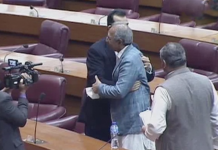The Supreme Court on Tuesday raised questions over the practice of recruiting of the children of government employees who died during the service.
A three-member SC bench comprising Chief Justice Gulzar Ahmed, Justice Mazhar Alam Khan Miankhel and Justice Muhammad Ali Mazhar heard the case filed by Siraj Mohammad who had sought court intervention after the Education Ministry failed to hire him following the death of his father.
During the course of proceedings, Petitioner Siraj said the ministry did not hire him despite the Peshawar High Court’s (PHC) order in his favour.
The Additional Attorney General said that Siraj’s father died in 2000 whereas the Prime Minister’s Package that promised a job to a family member came into effect in 2005.
Justice Mazhar Alam Khan Miankhel said that initially, the law was passed to facilitate the families of police and other martyrs.
Chief Justice Gulzar Ahmed said that the law was made for low-income employees but it was the children of officers who were recruited as ASI’s son say to hire him as direct DSP.
He said that government offices were not something to be inherited as employment in such a manner eliminated merit altogether.
The apex court annulled the PHC’s decision and said that only children whose father died after 2005 would be eligible for government service under Prime Minister package.
Meanwhile, the Supreme Court grilled the Punjab Police and the prosecution and maintained the decision to suspend the service of a Lahore police officer involved in theft and street crime for two years.
A three-member SC bench comprising Chief Justice Gulzar Ahmed, Justice Mazhar Alam Khan Miankhel and Justice Muhammad Ali Mazhar heard the case.
During the course of proceedings, the Chief Justice asked how many cases were registered against police official Shahid Nazir.
The Additional Advocate General Punjab said that there were total 18 cases while eight were mentioned in the charge sheet.
He said that cases against Shahid Nazir were disposed of as plaintiff did not appear.
He said that mobile phones, cash and jewelery were recovered from the policeman. Shahid Nazir was also involved in theft and purse snatching, he added.
The Chief Justice asked why Punjab Police did not contact the plaintiffs. The duty of the police was to protect the plaintiffs and restore the cases, he added.
He said that the police was not interested in registering cases against their colleague.
The Additional Advocate General said that the department fired but the service tribunal reduced the sentence and suspended the service for two years.
Separately, the Supreme Court on Tuesday ordered the federal and all four provincial governments to submit details regarding government residences.
A three-member SC bench comprising Chief Justice Gulzar Ahmed, Justice Mazhar Alam Khan Miankhel and Justice Muhammad Ali Mazhar heard the case regarding alleged illegal allotments of government residences.
During the course of proceedings, the court also sought an allotment policy for government housing from the Sindh government.
The Chief Justice observed that the Sindh government had submitted details of government residences in Karachi while details of government residences in other districts of Sindh were not provided.
The court also sought details of all residences from the Balochistan government and Capital Development Authority (CDA).
The Chief Justice asked what was the policy for allotment of government housing in Sindh? The Secretary Housing Sindh replied that the government houses were allotted only to secretariat employees in Sindh.
Upon this, the Chief Justice asked what was the fault of government employees of other departments? The Secretary Housing said that this policy was opted due to the small number of government houses. The Chief Justice said that the court would review the policy and related rules of the Sindh government on next date of hearing. Later, hearing of the case was adjourned for a month.











